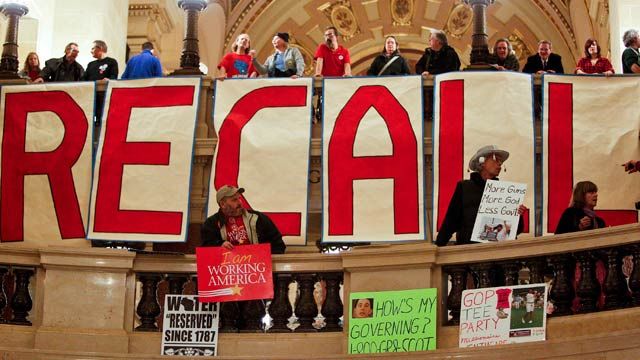
Governor Scott Walker’s victory on Tuesday is bad news for unions, particularly public-sector unions. In Wisconsin, Walker’s legislation stopping unions from automatically deducting member dues from their paychecks will likely remain on the books. The American Prospect‘s Harold Meyerson writes about what might happen if yesterday’s vote triggers a “domino effect“:
“Labor has certainly made clear that a war on unions comes at a price. But labor, its defeats notwithstanding, still punches well above its weight at election time and remains the chief impediment to Republican rule in states with a union presence. Taking it down — either through right-to-work legislation that weakens private-sector unions or collective-bargaining restrictions that weaken their public-sector counterparts — has long-term rewards both for Republican politicians and for businesses that depend on keeping wages low and benefits lower, if not non-existent.”
Many pundits were calling yesterday’s recall election the second most important election of the year. And today some are spinning Walker’s win as evidence that President Obama should be worrying about losing Wisconsin in November — which hasn’t happened to a Democrat running for president since 1984.
Last night, Governor Walker told Fox News that “Gov. Romney has an opportunity … to come in between now and Nov. 6 and make the case that he’s willing to make those same sort of tough decisions” as he did earlier in his tenure. There’s no doubt that in the coming days and weeks both campaigns will be re-evaluating their approach in Wisconsin, which the Obama campaign reclassified as a “toss-up” state on Monday.
But many analysts are writing today that it’s difficult to draw a straight line between Walker’s win and a Romney romp in November. Here are a few reasons why.
Exit polls favored Obama: By a 55 to 41 percent margin, Wisconsin voters indicated they would vote for Obama over Romney. CNN reports that voters said they thought Obama would do a better job of improving the economy than Romney (by a slim margin) and of helping the middle class (by a wider margin).
It was about the recall: As Wisconsin Rep. Paul Ryan (R) admitted in a New York Times piece on Monday there was “a slice of those Obama-Walker voters who think the recall is wrong, improper, a waste of money and an overreaction.” And in exit polls, 6 out of 10 voters said that they thought recall elections should be utilized only when an elected official has engaged in official misconduct.
“Walker-Obama” voters: Writing in the New Republic yesterday, Alec MacGillis attempted to dissect the paradox that is the Wisconsin voter who supports Walker and Obama. He writes that they are “swing voters who are … in a grudging pro-incumbent frame of mind. They see that we’re climbing back out of a deep hole and they see no reason to replace the guy on the ladder at this moment.” And he thinks there may be more voters like them in other swing states with improving economies.
Even though Walker’s victory may not presage trouble for Obama in November, if the domino effect kicks in, it may ultimately be bad for other Dems running in 2014 or 2016. Wonkbook‘s Ezra Klein explains:
“[T]he Wisconsin recall does have implications beyond 2012. Public-sector unions are a key part of the Democratic Party’s coalition. They provide money, manpower, and votes. Which is why Henry Olson, a vice president at the American Enterprise Institute, frames Walker’s legislation as a ‘defunding of the Democratic-party shock troops.’
Wisconsin’s new law won’t, on its own, radically change the power of public-sector unions. But Walker’s ability to withstand the recall will likely spur other governors to follow suit, and likely drain the enthusiasm of the opposition in other states. And even if it doesn’t, labor’s inability to win the recall is more evidence of their inability to reverse their own structural decline. They’re not winning on worksites, as the share of the labor force that’s unionized has been dropping for decades, and they’re not winning at the ballot box.
If you step back, then, two things are happening simultaneously among the key interest groups in American politics. Labor is getting weaker. And corporations, in part due to Citizens United, are getting much stronger. The electoral effect of that is obvious: It favors Republicans. But the legislative effect is, perhaps, more significant: It favors corporate interests in Congress, as Democrats will have to be that much more solicitous of business demands in order to keep from being spent into oblivion.”
At over $63 million dollars — much of it from outside sources — Tuesday’s race was the most expensive in the state’s history with Gov. Walker outspending Milwaukee mayor Tom Barrett by a margin of 7 to 1. The Plum Line‘s Gary Sargent writes that “[u]nions and Dems had hoped that grassroots organizing would be enough to offset that spending advantage, and they did in fact mount a huge effort along those lines. The labor-backed We Are Wisconsin signed up 50,000 volunteers in the last 96 hours, a volunteer army that knocked on 1.5 million doors throughout the state. It wasn’t nearly enough.”

